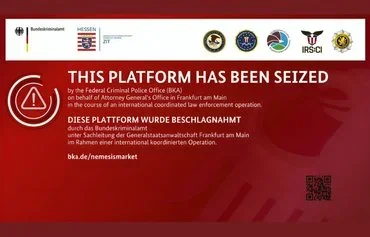Science Technology
US sanctions Iranian darknet operator in global drug crackdown
Iran-based darknet marketplace operator was laundering virtual currencies through the platform for drug traffickers and cybercriminals.

By Pishtaz |
The Iran-based administrator of darknet marketplace Nemesis, which facilitated nearly $30 million in illegal drug sales between 2021 and 2024, is now facing US sanctions.
The US Treasury blacklisted the marketplace's sole administrator, Behrouz Parsarad, on March 4.
Parsarad controlled Nemesis and its cryptocurrency wallets, earning millions in transaction fees while also laundering virtual currencies through the platform for drug traffickers and cybercriminals, the Treasury said.
Nemesis had swelled to over 150,000 registered users and more than 1,100 sellers by early 2024, according to blockchain intelligence firm TRM Labs.
The illicit enterprise processed millions in transactions through Bitcoin and Monero cryptocurrencies to maintain anonymity, it said.
"Parsarad sought to build -- and continues to try to re-establish -- a safe haven to facilitate the production, sale and shipment of illegal narcotics like fentanyl and other synthetic opioids," said Treasury official Bradley T. Smith.
Working in partnership with US law enforcement, the Treasury "will use all available tools to dismantle these darknet marketplaces and hold accountable the individuals who oversee them," he said.
Illegal drugs and services
Financial tracking revealed Parsarad's cryptocurrency wallets received over $850,000 between July 2022 and March 2024, with total transfers exceeding $1.6 million, according to blockchain intelligence firm Chainalysis.
The new sanctions highlight the broadening scope of illicit cryptocurrency activities emanating from the Islamic Republic beyond the traditional domains.
These include activities that support regional proxies such as Lebanese Hizbullah and Yemen's Houthis and finance malign cyber operations, per Chainalysis.
Before its shutdown, Nemesis operated as a platform for open trade in illegal drugs and services using built-in money laundering features, the Treasury said.
The platform's vendors sold fentanyl globally, both pure and secretly laced into other drugs, also offering false identification documents and hacking services to seize control of victims' online accounts and communications, it said.
Blockchain analysis revealed direct financial links between Nemesis vendors and Chinese drug precursor manufacturers, with funds flowing directly from the marketplace's vendors to these manufacturers, according to TRM Labs.
Even after the March 2024 takedown of Nemesis by US, German and Lithuanian authorities, Parsarad has discussed establishing a new darknet marketplace with former vendors, the Treasury said.
The March 4 sanctions identified 49 virtual currency addresses tied to his narcotics trafficking operations, it said.
Financial institutions and individuals risk sanctions or enforcement action if they engage in transactions with Parsarad, including providing or receiving any funds, goods, or services to or from him, the Treasury warned.
Great
Good.
Good.
Good.